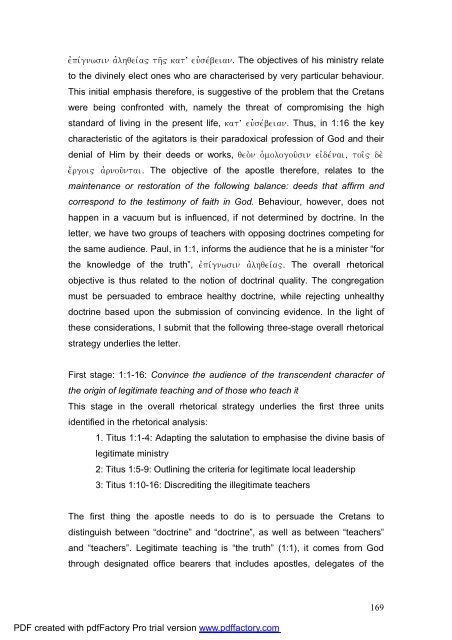A Text centred rhetorical analysis of Paul's Letter to Titus
A Text centred rhetorical analysis of Paul's Letter to Titus
A Text centred rhetorical analysis of Paul's Letter to Titus
You also want an ePaper? Increase the reach of your titles
YUMPU automatically turns print PDFs into web optimized ePapers that Google loves.
ejpivgnwsin ajlhqeiva" th`" katÆ eujsevbeian. The objectives <strong>of</strong> his ministry relate<br />
<strong>to</strong> the divinely elect ones who are characterised by very particular behaviour.<br />
This initial emphasis therefore, is suggestive <strong>of</strong> the problem that the Cretans<br />
were being confronted with, namely the threat <strong>of</strong> compromising the high<br />
standard <strong>of</strong> living in the present life, katÆ eujsevbeian. Thus, in 1:16 the key<br />
characteristic <strong>of</strong> the agita<strong>to</strong>rs is their paradoxical pr<strong>of</strong>ession <strong>of</strong> God and their<br />
denial <strong>of</strong> Him by their deeds or works, qeo;n oJmologou`sin eijdevnai, <strong>to</strong>i`" de;<br />
e[rgoi" ajrnou`ntai. The objective <strong>of</strong> the apostle therefore, relates <strong>to</strong> the<br />
maintenance or res<strong>to</strong>ration <strong>of</strong> the following balance: deeds that affirm and<br />
correspond <strong>to</strong> the testimony <strong>of</strong> faith in God. Behaviour, however, does not<br />
happen in a vacuum but is influenced, if not determined by doctrine. In the<br />
letter, we have two groups <strong>of</strong> teachers with opposing doctrines competing for<br />
the same audience. Paul, in 1:1, informs the audience that he is a minister “for<br />
the knowledge <strong>of</strong> the truth”, ejpivgnwsin ajlhqeiva". The overall <strong>rhe<strong>to</strong>rical</strong><br />
objective is thus related <strong>to</strong> the notion <strong>of</strong> doctrinal quality. The congregation<br />
must be persuaded <strong>to</strong> embrace healthy doctrine, while rejecting unhealthy<br />
doctrine based upon the submission <strong>of</strong> convincing evidence. In the light <strong>of</strong><br />
these considerations, I submit that the following three-stage overall <strong>rhe<strong>to</strong>rical</strong><br />
strategy underlies the letter.<br />
First stage: 1:1-16: Convince the audience <strong>of</strong> the transcendent character <strong>of</strong><br />
the origin <strong>of</strong> legitimate teaching and <strong>of</strong> those who teach it<br />
This stage in the overall <strong>rhe<strong>to</strong>rical</strong> strategy underlies the first three units<br />
identified in the <strong>rhe<strong>to</strong>rical</strong> <strong>analysis</strong>:<br />
1. <strong>Titus</strong> 1:1-4: Adapting the salutation <strong>to</strong> emphasise the divine basis <strong>of</strong><br />
legitimate ministry<br />
2: <strong>Titus</strong> 1:5-9: Outlining the criteria for legitimate local leadership<br />
3: <strong>Titus</strong> 1:10-16: Discrediting the illegitimate teachers<br />
The first thing the apostle needs <strong>to</strong> do is <strong>to</strong> persuade the Cretans <strong>to</strong><br />
distinguish between “doctrine” and “doctrine”, as well as between “teachers”<br />
and “teachers”. Legitimate teaching is “the truth” (1:1), it comes from God<br />
through designated <strong>of</strong>fice bearers that includes apostles, delegates <strong>of</strong> the<br />
PDF created with pdfFac<strong>to</strong>ry Pro trial version www.pdffac<strong>to</strong>ry.com<br />
169

















